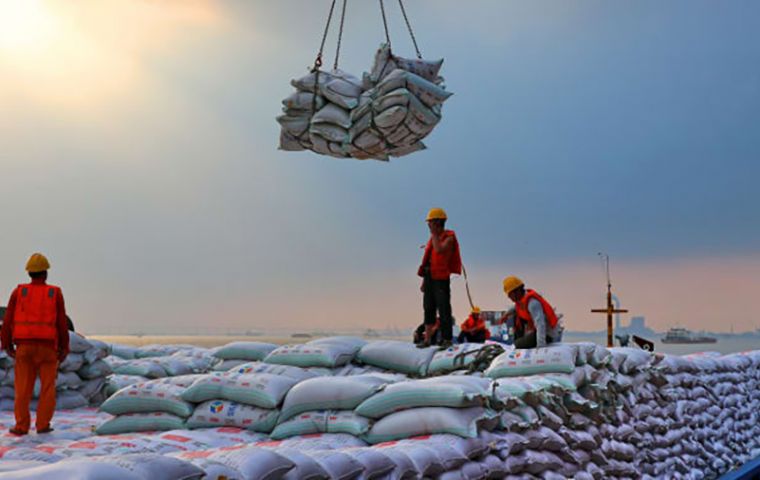MercoPress. South Atlantic News Agency
Chinese private firms return to buy some 600.000 tons of US soybeans
 The soybean purchases, which at more than 600,000 tons were the largest by Chinese private importers in more than a year
The soybean purchases, which at more than 600,000 tons were the largest by Chinese private importers in more than a year Privately run Chinese firms bought at least 10 boatloads of U.S. soybeans on Thursday, the country's most significant purchases since at least June, traders said, ahead of high-level talks next month aimed at ending a bilateral trade war that has lasted more than a year.
The soybean purchases, which at more than 600,000 tons were the largest by Chinese private importers in more than a year, are slated for shipment from U.S. Pacific Northwest export terminals from October to December, according to market sources.
The purchases were another indication that trade tensions between Washington and Beijing could be easing, after hitting a low last month when China suspended all U.S. farm product purchases in response to threats by President Donald Trump to impose more tariffs on Chinese goods.
Benchmark Chicago Board of Trade soybean futures jumped to one-month highs on Thursday, with the actively traded November contract in its steepest rally since May.
Beijing this week renewed a promise to buy U.S. agricultural goods such as pork and soybeans, the most valuable U.S. farm export. Large agricultural product purchases are a key U.S. stipulation for a trade deal, but the two sides remain far apart on other issues..
Thursday's soybean deals were the largest among private Chinese importers since Beijing raised import tariffs by 25% on U.S. soybeans in July 2018 in retaliation for U.S. duties on Chinese goods. Duties were raised an additional 5% this month.
Other soybean purchases over the past year have been made almost exclusively by state-owned Chinese firms which are exempted from the steep import tariffs.
Beijing in July offered to exempt five private crushers from import tariffs on U.S. beans arriving by the end of the year, but very few deals took place before buying was suspended.
Earlier on Thursday Beijing said Chinese companies were inquiring about prices of agricultural goods.




Top Comments
Disclaimer & comment rules-

Read all commentsSurely the purchases were “ship loads” and not “boat loads”? .
Sep 14th, 2019 - 07:47 pm 0Grains in general for many years back have been shipped in bulk, including soyabeans, hence the photo is either outdated or shows some other cargo loaded in bags.
Alternatively the cargo depicted in the picture is being shipped on a tween-decker type of vessel, not a bulk-carrier which needs no “securing” of the bulk cargo with bags on top to ensure that it does'nt slide and cause the vessel to lean either way, or say to Port or Starboard.
Commenting for this story is now closed.
If you have a Facebook account, become a fan and comment on our Facebook Page!